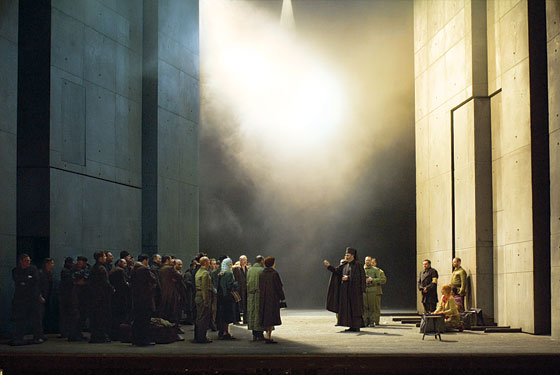
Leos Janácek’s From the House of the Dead has finally, indispensably arrived at the Metropolitan Opera, in a production that leavens the work’s gulag grimness with the pleasures of great theater. It’s a simultaneously sprawling and compact work, packing a suite of tragic stories, grotesque entertainments, acts of businesslike cruelty, and anthropological observations into 100 minutes of burning music.
The composer forged this work out of Dostoevsky’s novel, which reads less like fiction than like a report on a society of captives—its thimblefuls of freedom, its meager joys, the codes of behavior that make imprisonment survivable. Both book and opera lack the traditional appurtenances of music drama: women, romance, a protagonist, or an overarching plot. The director, Patrice Chéreau, ignores these limitations: He binds murderous anecdotes and hostile banter into a taut, powerful story. A troupe of convicts performs a pantomime for the others, and Chéreau exploits the scene for its bawdiness and humor. Janácek sprinkled flecks of tenderness amid the gray despair, and Chéreau capitalizes on them, too, as when an older man—Dostoevsky’s narrator, sung with melancholy dignity by Willard White—befriends a fragile youth.
Janácek’s score is a thing of brutal beauty. It’s hard to miss the rhythmic insistence and melodic passages that go round and round as if they were imprisoned in the listener’s mind. But the toughness need not be forced. Esa-Pekka Salonen, making his preposterously belated Met debut, conducts with a thrilling mix of aggressiveness and precision. The orchestra and chorus give off a hard, diamond sheen.
Prison is a place where discipline and savagery amplify each other. They do the same in this production, with its choreography of wild lurches and flailing arms, its focus and dangerous energy. Set designer Richard Peduzzi encloses the crowded cast within high concrete walls that every so often slide open so that they can shut again with despotic finality. Fights break out—not the usual polite grappling that passes for a brawl in opera, but crackling bursts of violence. Yet not one member of the flawless cast sacrifices an iota of musical control. Eric Stoklossa, a tenor with a voice like copper wire—fine and flexible but surprisingly strong—is making a poignant house debut as the poor young Alyeya. The superb baritone Peter Mattei owns the opera’s final third when, as the convict Shishkov, he narrates his crime of passion with a ravishing mixture of nobility and bitterness.
Chéreau’s production shares a lot of ingredients with Luc Bondy’s embarrassing Tosca: the director’s French inflection, the same set designer, slovenly costumes, a lugubrious air, dingy lighting, and simulated onstage sex. But if Tosca’s vapid avant-garde clichés raised the alarm that the Met’s Peter Gelb might be miring the company in trendiness, From the House of the Dead reassuringly suggests that the same sensibility can also yield a terrific show.
From the House of the Dead
Lincoln Center for the Performing Arts
